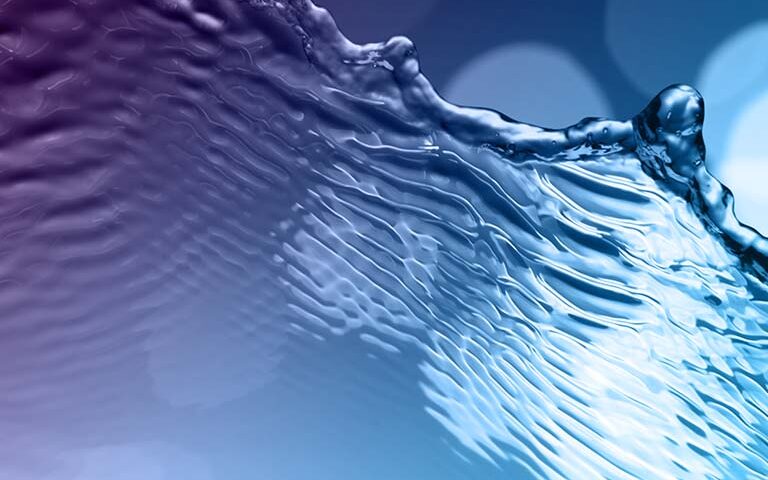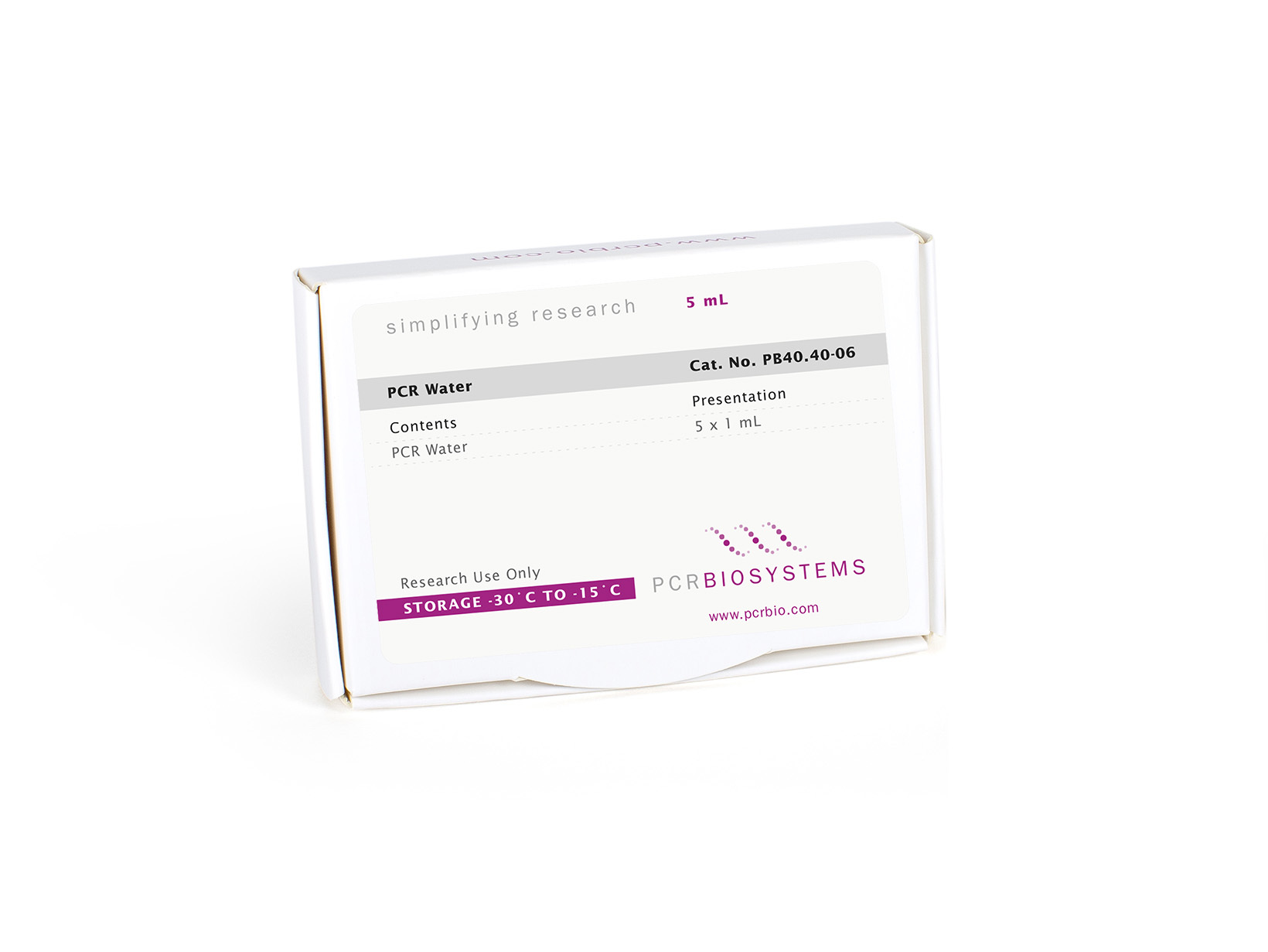To view your price please login or contact us
PCR Water
PCR Water is a molecular biology grade product that is suitable for sample dilution, and use as an ultra-pure diluent for PCRs and other molecular biology reactions.
This product is DNase, RNase, protease, and DNA-free, as tested by our strict quality control assays. Get maximum peace of mind and reduce variability in your molecular assays by using PCR Water in all your workflows and on sensitive samples.
Features:
- DNase, RNase, & protease-free
- DNA-free, for no background contamination
- Rigorously QC-tested, for maximum peace of mind
More Information
PCR Water can be used as a reaction component with all PCR Biosystems reagents and all other manufacturer’s products, where the corresponding manual or guidelines require the use of PCR-grade or high-purity water.
Additionally, this product is rigorously tested to ensure maximum peace of mind when setting up molecular biology reactions. DNase, RNase, and protease activity, as well as DNA, are below the limit of detection of our rigorous assays.
Product pack sizes are available in small (5 mL) and large volumes (50 mL), and in both pre-aliquoted (5 x 1 mL and 50 x 1 mL) or single-bottle (1 x 5 mL and 1 x 50 mL) formats, for maximum convenience based on your workflow and throughput requirements.
Why use PCR Water in you molecular biology workflow?
Using deionised ultra-pure water in PCR workflows brings significant benefits, primarily by eliminating the risk of contamination that can adversely affect the sensitivity and specificity of the PCR reactions. In PCR, even minute traces of impurities such as ions, organic compounds, or microbial contaminants can lead to nonspecific amplification or inhibit the polymerase enzyme, thereby compromising the accuracy and reliability of the results. Deionised ultra-pure water, having undergone stringent purification processes to remove these contaminants, ensures a high level of consistency and reproducibility in PCR assays. It provides a stable and controlled environment that enhances the efficiency of the DNA polymerase, facilitating precise amplification of the target sequence. This level of purity is especially crucial in applications requiring high sensitivity, such as quantitative PCR (qPCR) and diagnostic testing, where the integrity of the results directly impacts research outcomes and patient care.
Applications
- PCR
- qPCR
- All molecular biology reactions
- Sample dilution
- Use as no-template control
Specifications
PCR Water
Component
5 mL
5 mL
50 mL
50 mL
PCR Water
1 x 5 mL
5 x 1 mL
1 x 50 mL
50 x 1 mL
PCR Water
Component
PCR Water
5 mL
1 x 5 mL
5 mL
5 x 1 mL
50 mL
1 x 50 mL
50 mL
50 x 1 mL
Reaction Volume
Storage
Not applicable
On arrival, products should be stored between -30 and -15°C. The product can be stored indefinitely prior to first use.
Reaction Volume
Not applicable
Storage
On arrival, products should be stored between -30 and -15°C. The product can be stored indefinitely prior to first use.
Documents
Product Manuals
Material Safety Data Sheets
Certificate of Analysis Finder
FAQs
Can I dilute my samples with PCR water?
Yes. In fact, it is highly recommended to use PCR water when preparing and diluting molecular biology samples. This reduces the potential for contamination of samples themselves, and also ensures a reduced ion content, which minimises the potential of interference with enzymatic reactions.
Can I use PCR water for molecular biology assays other than PCR?
PCR water from PCR biosystems can be used with all common molecular biology reagents, regardless of manufacturer or application type, where the corresponding manual or guidelines require the use of molecular biology-grade, PCR-grade, or ultra-pure water.
What does DNase, RNase, and protease-free mean with regard to PCR water?
It means that DNase, RNase and protease activity were below the limit of detection of our stringent quality control assays. The product is guaranteed to be free of these enzymatic activities, based on this definition, prior to first use. Once opened, care should be taken to avoid contamination, particularly if the same aliquot will be stored after opening the first time.
More Information
PCR Water can be used as a reaction component with all PCR Biosystems reagents and all other manufacturer’s products, where the corresponding manual or guidelines require the use of PCR-grade or high-purity water.
Additionally, this product is rigorously tested to ensure maximum peace of mind when setting up molecular biology reactions. DNase, RNase, and protease activity, as well as DNA, are below the limit of detection of our rigorous assays.
Product pack sizes are available in small (5 mL) and large volumes (50 mL), and in both pre-aliquoted (5 x 1 mL and 50 x 1 mL) or single-bottle (1 x 5 mL and 1 x 50 mL) formats, for maximum convenience based on your workflow and throughput requirements.
Why use PCR Water in you molecular biology workflow?
Using deionised ultra-pure water in PCR workflows brings significant benefits, primarily by eliminating the risk of contamination that can adversely affect the sensitivity and specificity of the PCR reactions. In PCR, even minute traces of impurities such as ions, organic compounds, or microbial contaminants can lead to nonspecific amplification or inhibit the polymerase enzyme, thereby compromising the accuracy and reliability of the results. Deionised ultra-pure water, having undergone stringent purification processes to remove these contaminants, ensures a high level of consistency and reproducibility in PCR assays. It provides a stable and controlled environment that enhances the efficiency of the DNA polymerase, facilitating precise amplification of the target sequence. This level of purity is especially crucial in applications requiring high sensitivity, such as quantitative PCR (qPCR) and diagnostic testing, where the integrity of the results directly impacts research outcomes and patient care.
Applications
- PCR
- qPCR
- All molecular biology reactions
- Sample dilution
- Use as no-template control
Specifications
PCR Water
Component
5 mL
5 mL
50 mL
50 mL
PCR Water
1 x 5 mL
5 x 1 mL
1 x 50 mL
50 x 1 mL
PCR Water
Component
PCR Water
5 mL
1 x 5 mL
5 mL
5 x 1 mL
50 mL
1 x 50 mL
50 mL
50 x 1 mL
Reaction Volume
Storage
Not applicable
On arrival, products should be stored between -30 and -15°C. The product can be stored indefinitely prior to first use.
Reaction Volume
Not applicable
Storage
On arrival, products should be stored between -30 and -15°C. The product can be stored indefinitely prior to first use.
Documents
Product Manuals
Material Safety Data Sheets
Certificate of Analysis Finder
FAQs
Can I dilute my samples with PCR water?
Yes. In fact, it is highly recommended to use PCR water when preparing and diluting molecular biology samples. This reduces the potential for contamination of samples themselves, and also ensures a reduced ion content, which minimises the potential of interference with enzymatic reactions.
Can I use PCR water for molecular biology assays other than PCR?
PCR water from PCR biosystems can be used with all common molecular biology reagents, regardless of manufacturer or application type, where the corresponding manual or guidelines require the use of molecular biology-grade, PCR-grade, or ultra-pure water.
What does DNase, RNase, and protease-free mean with regard to PCR water?
It means that DNase, RNase and protease activity were below the limit of detection of our stringent quality control assays. The product is guaranteed to be free of these enzymatic activities, based on this definition, prior to first use. Once opened, care should be taken to avoid contamination, particularly if the same aliquot will be stored after opening the first time.







